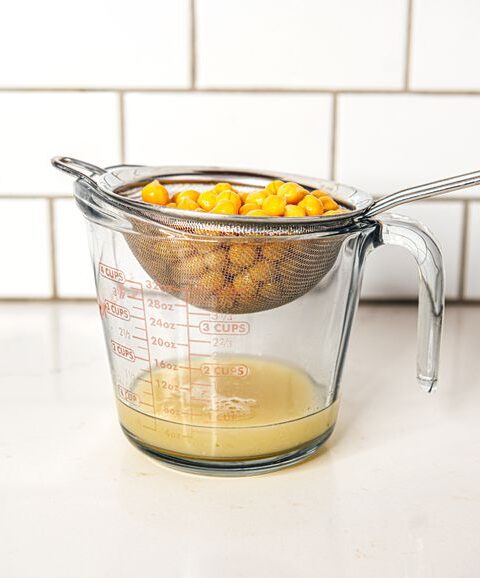I am replacing the one large egg from my recipe with 1/4 cup of carbonated water. The adaption calls for 1/4 a cup of the carbonated water because 1 large egg is equivalent to 1/4 a cup when whisked.1
The role of eggs in baking cookies contributes to a variety of characteristics including its structure and lift. Without the role of the egg in the recipe, the dough would end up crumbly, tough, and difficult to work with. Carbonated water in baking can act as a binder, emulsifier, and leaven. Just like eggs, carbonated water will help hold the dry ingredients together in the recipe to create the structure of the cookies. The carbonated water can act as an emulsifier by turning the dough into a lighter, airier texture; the lightness is caused by the bubbles of carbon dioxide gas being introduced into the dough, creating spaces throughout the dough. Carbonated water consists of dissolved carbon dioxide gas that is either artificially injected through pressure or naturally present; this allows for the water to trap the air bubbles when mixed with the batter that end up expanding under the heat, giving the dough lift and lightness.2 The pockets of air that were created by the carbonation also trap water droplets that evaporate and release gas that helps give the cookie lift. With all of this in mind, I predicted that the cookies would have more volume than with the egg and be slightly less sweet.
You can see a noticeable difference in texture between the two doughs. The dough with the egg (pictured on the left) is creamy and smooth, also looking thick and adhesive. The dough with the carbonated water (pictured on the right) is gritty and slurry, appearing to be a more liquid state than solid; this indicates that carbonated water might not bind as well as research indicated.


Since my research indicated that no time changes need to be made for substituting the egg with carbonated water, I kept both doughs in the oven for the same time. After each cookie set had its time to cool, I compared the results of the cookies. The cookies that used the eggs are pictured on the left while the cookies that used the carbonated water are pictured on the right.


Unexpectedly, I found that the cookies that used the carbonated water were much airier than the cookies that used the egg. From the pictures, I assumed that the egg cookies would be chewy and full while the carbonated water cookies would be crumbly, crunchy, and full. The egg cookies did turn out to be very chewy and slightly unstable, as they would fall apart pretty easily. They had a distinctive nutty flavor, and the cranberry was detectable instantly. Additionally, where there was more dough but less cranberries/nuts/chocolate, there was a slight gritty texture due to the type of flour used. The egg cookies maintained fullness in terms of interior thickness and were overall enjoyable. In contrast, the carbonated water cookies were surprisingly chewy despite looking crunchy. A key finding with these cookies were that they had almost no fullness in terms of interior thickness; it was almost as if the outside layer of the cookie was the only edible part while everything else was air. Since these cookies seemed to be filled with just air, they did not leave you feeling full even after eating a few. There was no grainy texture to these cookies, but they did have a reduced nut flavor. It seems like all flavor levels in these cookies were brought down in intensity compared to the egg cookies. Lastly, these cookies were smaller in size and seemed to have more browning on the underside compared to the egg cookies.
These findings were unanticipated but helps to illuminate the role that eggs have in cookies. We can clearly see that they helped bring out the flavors, hold ingredients together well enough to have a smooth surface (compared to what looks crunchy and crumbly on the other cookies), and provide fullness in terms of emulsion just like the research said eggs would. I can deduce that carbonated water can be a substitute, but it is likely to not be a desirable result if you use them in a cookie recipe. It seems that the eggs are necessary to pull everything together for such a small baked good, meaning that it might produce better results on larger goods such as cakes.
_____________________________________________________________________________________________
Pictures by: Alexis Jefferson, April 24, 2022, Middletown, PA 17057
- Berg, F. The Best Egg Substitutes for Baking and Cooking.
https://www.foodnetwork.com/how-to/packages/food-network-essentials/the-best-eggsubstitutes-for-baking-and-cooking (accessed 2022 -04 -10). - Rentschler, K. From the Center of the Earth, the Mighty Bubble.
https://www.nytimes.com/2002/03/20/dining/from-the-center-of-the-earth-the-mightybubble.html?msclkid=2641ba78bc4611eca61e3ca0605dc827 (accessed 2022 -04 -14).


